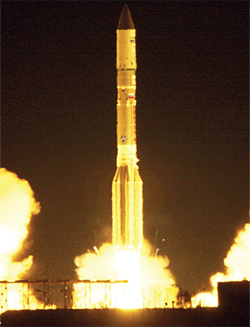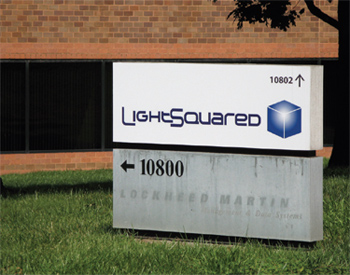LightSquared Fights Interference Claims
RESTON, VA. — LightSquared, a recent startup that intended to quietly build out a high-speed mobile broadband network to compete with Verizon, AT&T and Sprint, suddenly finds itself in the scorching glare of publicity over alleged interference with global positioning satellite (GPS) receivers.
Now deep into the digital era, television has become dependent on timing provided by GPS receivers for a wide variety of functions, from time stamps on video feeds to control room automation to the synchronization of transmitters in a single-frequency network. (See "Can Terrestrial Broadcasting and GPS Co-exist in Adjoining Spectrum?" by Charles W. Rhodes)

LightSquared will use the SkyTerra-1 satellite, launched in November 2010. Many other users of GPS systems are also highly concerned about interference, including the military, Coast Guard and maritime operators, search-and-rescue organizations, dozens of industry associations and even citizens' groups that have an interest in maintaining the accuracy of GPS systems.
In a July 1 filing with the FCC, LightSquared laid the problem squarely at the feet of GPS receiver manufacturers. Acknowledging that there is the potential for interference between LightSquared's wireless broadband operations and GPS equipment, the company said. "Legacy GPS receivers do not adequately reject transmissions from base stations operating in the adjacent frequency band because GPS receivers have been deliberately, or sometimes, inadvertently, designed or manufactured with the assumption that there would be no adjacent-band terrestrial transmissions."
LightSquared also said that the GPS industry has known about the possibility of adjacent-band interference since such use was identified by the FCC in 2003. Yet, according to LightSquared, GPS manufacturers ignored reasonable engineering solutions such as filters in a rush to serve the exploding market for inexpensive navigation systems.
Today, GPS is critical to aircraft navigation, shipping, police operations and hundreds of other applications that make GPS one of the few sacred cows in the technology industry. Eliminate a slice of spectrum here or reduce power there, and you might hear the faint anquished cries of one particular industry. Mess with GPS and you've stepped into a steaming pile of trouble, and that's where LightSquared is today.
SATELLITE BACKGROUND
In 2004, LightSquared received approval to build out a Long-Term Evolution (LTE) network in the L-band, directly below the GPS band that begins at 1559 MHz. Tracing its roots back to 1988, LightSquared's predecessors were mostly in the satellite communications business, including a long-runnning venture called SkyTerra. Starting in 2004, the company's technology plan had a heavy overlay of satellite communications, although the GPS interference concern stems from LightSquared's plans to have as many as 40,000 terrestrial base stations in the United States, each with power output as high as 15,000 Watts.
LightSquared's plan is to act as a wholesaler of wireless broadband services, allowing other companies (including some well-known cellular carriers) to sell LightSquared's bandwidth under a variety of names. Sprint has signed a long-term contract to provide some services for LightSquared, a deal that could easily get Sprint convenient access to a fourth-generation (4G) cellular network if the company's other 4G plans don't work out. MetroPCS, a cellular carrier with coverage in scattered regions in the United States, is eyeing LightSquared as a way to get reasonable roaming costs in the likely event that Verizon and AT&T squeeze MetroPCS with high roaming prices. Speaking at a Morgan Stanley technology conference in February, MetroPCS chief financial officer Braxton Carter said, "If [LightSquared] can get funding and if they can get the network built, it's a wonderful option for us."
Another of LightSquared's partners is Inmarsat, a satellite services provider with global customers.
Getting the network built is no small task for LightSquared, although the company seems to be well funded by its billionaire founder, Philip Falcone. Investors are clearly looking beyond GPS interference issues, as LightSquared announced July 5 that it raised $265 million of additional capital to support its operations and network buildout.
As for LightSquared's plans, the company expects to begin rollout of its LTE network in 2012, with the goal of reaching 260 million Americans by 2016. One facet of this network is the SkyTerra-1 satellite, which was launched in November 2010. With a 22-meter L-band reflector-based antenna, SkyTerra-1 has the largest commercial antenna reflector to be put into satellite service.
Its partnership with Inmarsat holds the glimmer of a solution regarding GPS interference, as Inmarsat controls spectrum in the L-band that is further away from the sensitive GPS frequencies. LightSquared is already claiming that reducing its base stations' power and swapping spectrum with Inmarsat will eliminate the interference claims.

LightSquared is based in Reston, Va. "This is a solution which ensures that tens of millions of GPS users won't be affected by LightSquared's launch," LightSquared CEO Sanjiv Ahuja said.
UTTER RELIABILITY
Broadcasters and legions of others who rely on GPS receivers are not so sure and will carefully monitor tests to ensure that GPS is utterly reliable. If just one airplane bound for San Francisco ends up in Seattle because of GPS interference, LightSquared's billions in network technology will turn out to be one more tech startup that gets auctioned off at a few cents on the dollar.
The controversy has spawned the formation of a new group, "The Coalition to Save Our GPS," which includes aviation, agricultural and hi-tech interests, among others—all opposed to the introduction of any technology that would threaten the integrity of GPS. The group criticized LightSquared's latest defense in which its said interference problems were due to the inferior quality of GPS receivers.
"Starting last year and continuing until June 30, LightSquared repeatedly said its proposed operations would not interfere with GPS. That was until June 30, when the FCC-mandated group studying this question issued its 1,000-page plus report finding LightSquared's plans would cause massive, harmful interference with GPS," said Dale Leibach, coalition spokesman. "That's when LightSquared suddenly changed its proposal completely and began saying that its 'new' plan would cause no interference with GPS."
Being good spectrum neighbors is the bread-and-butter of wireless operations, and the president's National Broadband Plan (NBP) is the hunger driving this food fight. On June 28, Barack Obama signed a memorandum that directs telecom companies and the government to locate blocks of spectrum that can be used to provide mobile broadband to Americans in the next decade.
As entrenched spectrum users (such as broadcasters) see the hungry eyes of the government and telecom companies turn their way, LightSquared's struggle with GPS interference can be either a speed bump on the way to an NBP or it can show how a sacred cow can block the road to spectrum reallocation. In a statement on March 16 (but before the widespread discussion of GPS interference), President Obama went on record as supporting exactly the sort of network that is being built by LightSquared.
"My Administration will build upon our efforts over the past year to make America's nationwide broadband infrastructure the world's most powerful platform for economic growth and prosperity, including improving access to mobile broadband, maximizing technology innovation, and supporting a nationwide, interoperable public safety wireless broadband network," the president said.
However, presidential and federal government support can fade quickly if the public perceives a safety issue—or even a significant loss in convenience. With a GPS receiver in the cell phone in our pockets, millions of us count on their accuracy and convenience. Broadcasters rely on GPS to provide the pulse that enables automation and a dozen other important functions.
How LightSquared handles this issue will give broadcasters clues to prepare for future spectrum battles.
Note: LightSquared did not respond to our calls for comment.
The professional video industry's #1 source for news, trends and product and tech information. Sign up below.
Bob Kovacs is the former Technology Editor for TV Tech and editor of Government Video. He is a long-time video engineer and writer, who now works as a video producer for a government agency. In 2020, Kovacs won several awards as the editor and co-producer of the short film "Rendezvous."

